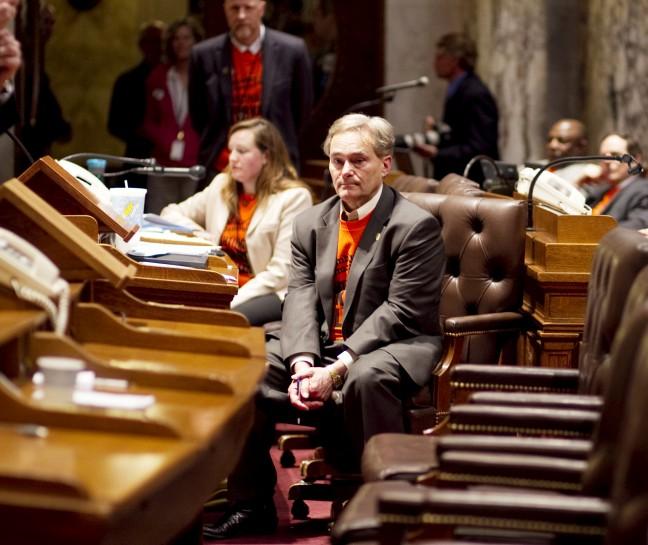While the governor prepared to address media in his conference room around 5 p.m. Friday night, Assembly Democrats were busy drafting amendments in caucus and were unaware the Republicans had sidled into the chamber to begin voting on the controversial budget repair bill without them.
Gov. Scott Walker said that although he acknowledged the thousands of protesters outside the Capitol – whose loud chants could be heard inside the governor’s conference room – 300,000 state employees did not skip work on a Friday and their voices, along with 5.5 million Wisconsinites, deserved to be heard as well.
“We’re not going to allow for one minute the protesters to feel like they can drown out the voices of those millions of taxpayers across the state of Wisconsin,” Walker said.
Walker said asking government employees to contribute 5.8 percent of their income to pensions and 12.6 percent to health care is a modest request when compared to blue collar, private sector employees he said pay 25 to 50 percent of their health care premiums.
Walker also addressed criticism surrounding provisions in the bill that would severely limit public employee union members to collectively bargain. He said the budget for the next biennium contains big aid cuts to local government, which would come with massive layoffs if the unions’ ability to bargain contracts is not curtailed.
While Walker went on to discuss how Wisconsin’s civil service grievances system – the strongest in the nation, he said – would still be in place and that guarantees protections similar to bargaining, an unprecedented political move took place in the Assembly chamber.
At 4:55 – five minutes before the session was scheduled to begin – Assembly Clerk Patrick Fuller began roll call and quorum was ordered although no Democrats were in the chamber. Republicans quickly voted to adopt the amendment passed by the Joint Finance Committee and then began a vote to put the bill into a stage where it could no longer be amended.
Then came the Democrats.
Rep. Gordon Hintz, D-Oshkosh, darted into the chamber first and picked up his microphone to speak but Assembly Speaker Pro Tempore Bill Kramer, R-Waukesha, did not turn on Hintz’s microphone.
Over the cries of Assembly Minority Leader Peter Barca, D-Kenosha, and the entire Democratic caucus, Kramer asked for a voice-vote to engross the bill, which passed with a chorus of ‘ayes’ from Republicans at 4:57 p.m. Not until Barca said the speaker must be deaf did Kramer turn Barca’s microphone on.
“That you would first of all be here before five o’ clock and take an illegal vote before the proceedings are supposed to start,” Barca said. “Unbelievable. Unprecedented. Un-American, not in keeping with the values of this state. You should be ashamed of yourself, each and every one of you, especially you Mr. Speaker, who should know the rules of this body.”
After some discussion, Assembly Majority Leader Jeff Fitzgerald, R-Horicon, addressed the chamber and said he thought the Democrats were not going to show up, like their Senate colleagues on Thursday.
However, Fitzgerald said he understood Democrats still had some amendments to draft and decided to adjourn the meeting until Tuesday at 10 a.m. when the chamber would debate the bill from scratch.
A joint statement released by Fitzgerald, Rep. Robin Vos, R-Burlington and Rep. Scott Suder, R-Abbotsford, said they adjourned because of security concerns.
Assembly Republicans have been briefed about a secure tunnel system leading from the Capitol to the Department of Justice that can be used for escape, said Kevin Benish, Rep. Tamara Grigsby’s spokesperson, who was informed of the tunnel plan by the DOJ.
The events in the Assembly marked the end of a legislative week full of political firsts that gained national attention. U.S. Congressman Ron Kind, D-Wis., arrived in Madison Saturday morning following a 7:30 a.m. flight out of Washington D.C.
Kind said he came back to Wisconsin to show his support for public servants and their families. He said a conversation needs to take place between the unions and the governor, who Kind said is unilaterally shutting collective bargaining down.
The Senate will convene without the 14 missing Democrats Tuesday, said Andrew Welhouse, spokesperson for Senate Majority Leader Scott Fitzgerald, R-Juneau. Welhouse said the Senate will be voting on non-spending bills, which require a simple majority rather than the two-thirds majority mandated for spending bills.














